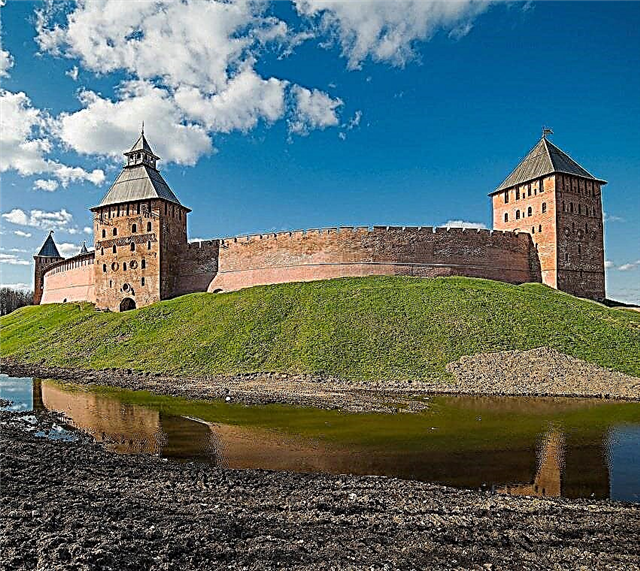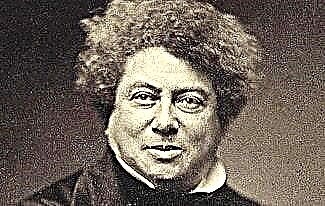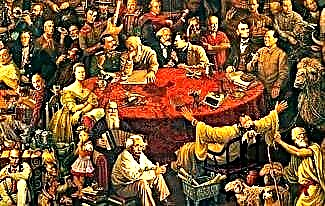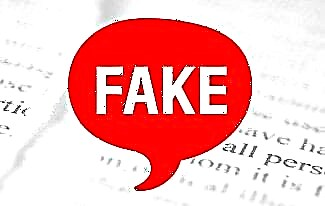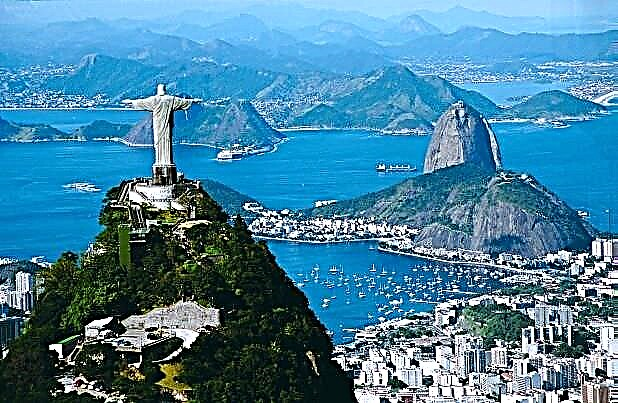Yalta (Crimean) Conference of the Allied Powers (February 4-11, 1945) - the second meeting of the leaders of the 3 countries of the anti-Hitler coalition - Joseph Stalin (USSR), Franklin Roosevelt (USA) and Winston Churchill (Great Britain), dedicated to the establishment of world order after the end of World War II (1939-1945) ...
About a year and a half before the meeting in Yalta, representatives of the Big Three had already gathered at the Tehran Conference, where they discussed issues of achieving victory over Germany.

In turn, at the Yalta Conference, the main decisions were made concerning the future division of the world between the victor countries. For the first time in history, virtually all of Europe was in the hands of only 3 states.
Goals and decisions of the Yalta conference
The conference focused on two issues:
- New borders had to be defined in the territories occupied by Nazi Germany.
- The victorious countries understood that after the fall of the Third Reich, the forced reunification of the West and the USSR would lose all meaning. For this reason, it was necessary to carry out procedures that would guarantee the inviolability of the established boundaries in the future.
Poland
The so-called "Polish question" at the Yalta conference was one of the most difficult. An interesting fact is that during the discussion, about 10,000 words were used - this is a quarter of all words spoken at the conference.
After lengthy discussions, the leaders were unable to reach full understanding. This was due to a number of Polish problems.
As of February 1945, Poland was under the rule of the provisional government in Warsaw, recognized by the authorities of the USSR and Czechoslovakia. At the same time, the Polish government in exile acted in England, which did not agree with some of the decisions adopted at the Tehran conference.
After a lengthy debate, the leaders of the Big Three felt that the exiled Polish government had no right to rule after the end of the war.
At the Yalta Conference, Stalin was able to convince his partners of the need to form a new government in Poland - the "Provisional Government of National Unity." It was supposed to include Poles living both in Poland itself and abroad.
This state of affairs fully suited the Soviet Union, since it allowed it to create the political regime it needed in Warsaw, as a result of which the confrontation between the pro-Western and pro-communist forces with this state was resolved in favor of the latter.
Germany
The heads of the victorious countries adopted a resolution on the occupation and partition of Germany. At the same time, France was entitled to a separate zone. It is important to note that issues concerning the occupation of Germany were discussed a year earlier.
This decree predetermined the split of the state for many decades. As a result, 2 republics were formed in 1949:
- Federal Republic of Germany (FRG) - located in the American, British and French zones of occupation of Nazi Germany
- German Democratic Republic (GDR) - located on the site of the former Soviet occupation zone of Germany in the eastern region of the country.
The participants in the Yalta Conference set themselves the goal of eliminating German military power and Nazism, and ensuring that Germany can never upset the world in the future.

For this, a number of procedures were carried out aimed at destroying military equipment and industrial enterprises that could theoretically produce military equipment.
In addition, Stalin, Roosevelt and Churchill agreed on how to bring all war criminals to justice and, most importantly, to overcome Nazism in all its manifestations.
Balkans
At the Crimean Conference, much attention was paid to the Balkan issue, including the tense situation in Yugoslavia and Greece. It is generally accepted that in the fall of 1944, Joseph Stalin allowed Britain to decide the fate of the Greeks, which is why the clashes between the communist and pro-Western formations here were resolved in favor of the latter.
On the other hand, it was actually recognized that power in Yugoslavia would be in the hands of the partisan army of Josip Broz Tito.
Declaration on a Liberated Europe
At the Yalta Conference, the Declaration on a Liberated Europe was signed, which assumed the restoration of independence in the liberated countries, as well as the right of the allies to "provide assistance" to the affected peoples.
European states had to create democratic institutions as they saw fit. However, the idea of joint assistance was never realized in practice. Each victorious country had power only where its army was located.
As a result, each of the former allies began to provide "assistance" only to ideologically close states. With regard to reparations, the Allies were never able to establish a specific amount of compensation. As a result, America and Britain will transfer 50% of all reparations to the USSR.
UN
At the conference, the question was raised about the formation of an international organization capable of guaranteeing the immutability of the established boundaries. The result of long negotiations was the founding of the United Nations.
The UN was to monitor the maintenance of the world order throughout the world. This organization was supposed to resolve conflicts between states.

At the same time, America, Britain and the USSR still preferred to solve global problems among themselves through bilateral meetings. As a result, the UN was unable to resolve the military confrontation, which later involved the United States and the USSR.
Yalta's legacy
The Yalta Conference is one of the largest interstate meetings in the history of mankind. The decisions taken at it proved the possibility of cooperation between countries with different political regimes.
The Yalta system collapsed at the turn of the 1980s and 1990s with the collapse of the USSR. After that, many European states experienced the disappearance of the former demarcation lines, finding new borders on the map of Europe. The UN continues its activities, although it is often criticized.
Displaced Persons Agreement
At the Yalta Conference, another treaty was signed, which is of great importance for the Soviet Union - an agreement concerning the repatriation of military and civilians freed from Nazi-occupied territories.
As a result, the British transferred to Moscow even those emigrants who never had a Soviet passport. As a result, the forced extradition of the Cossacks was carried out. This agreement has affected the lives of over 2.5 million people.
Photo of the Yalta conference








